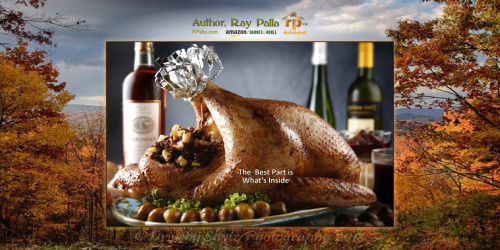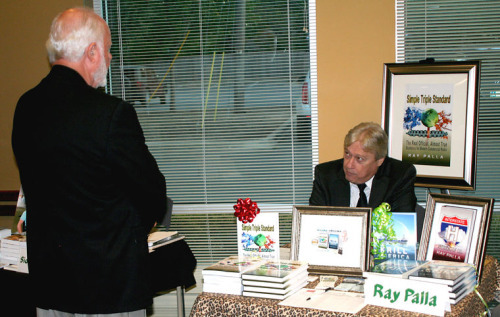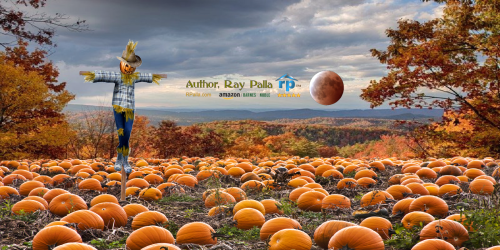Ray Palla's Blog, page 11
November 1, 2015
Proper Verb/Noun Usage:
An Observation from Ranger Wordsmith,...

Proper Verb/Noun Usage:
An Observation from Ranger Wordsmith, Monitor of Sapient Vocabulary (IE: The Modern Lexicon and Public Vernacular)
— By Ray Palla
Current social media discussion trend is to use a NOUN in the traditional place of an ACTION VERB. It is, by all literary experts, considered to be a faux pas or blunder, but is it really a vernacular carnal sin?
Here’s an example: “John consistently sharks his competition.” If you take it another step further you could end up with a sentence like: “An explosion in the Mid-East today could impetus World War tomorrow.”
On one hand the critics all agree that poor linguistics can kill an author, especially a burgeoning newcomer on the block. The argument from them is that the reader becomes uncomfortable with the dialogue and ultimately bored from the persistent mental translation required by the writer. All the rule books tend to admonish the use of local vernacular, even within fiction works. The ultimate rule book mandate is that all usage of common local phrasing be, at least, kept to the discourse of characters (rather than within the dialog of the protagonist), and confined to a “very minimum” treatment.
On the other hand I submit the examples of Mark Twain’s — “The Adventures of Tom Sawyer” and its sequel, “Adventures of Huckleberry Finn,” the latter often called “The Great American Novel.” Or consider Pulitzer Winner Ernest Hemingway’s — “The Old Man and the Sea” or anything written by famous satirist Will Rogers. Without the keenly woven usage of local phrases and colorful catchy words, would any of those works today be considered great? I submit that the answer to that question is a resounding, “No.” I argue that without the astute insight and flair of the vernacular and esoteric lexicon, these books would fall short of conveying a truthful representation of the factual places and times. I further submit that the characters and protagonists alike would appear parched, tired, and perhaps even lifeless.
Today’s phrasings like, “She skanks her way through the high school hallway,” paint a graphic that imposes on the mind’s eye. The communication is much faster than the literally approved option, “She looked like a skank as she sashayed through the high school hallway.” I suppose the shortening of things is the result of quickened lifestyle paces and perhaps the use of Twitter and other short-fast methods of interaction. I further suppose that it may be just an inconsequential phase in the development of human nature, but I can’t help finding it entertaining and a livelier approach to attention and interest harvesting.
That said, I submit to you the question, “Within a professionally written work, would you rather smell old-school prose as you read, or nose a fresh aroma?”
VERNACULAR?
- Use it. □
- Loose it! □
RPalla.com
COMMENT:
To reply to your question, I don’t mind “a nose of fresh aroma” provided that I can understand it. The problem, as I see it, is you have to know your audience and if they will be able to understand what a character is saying or what a description means. Often times when reading a novel, I haven’t a clue as to what the character is saying as I am unfamiliar with the local vernacular. I have seen authors trying to address this by including a brief list of terms used.
Regards,
Norm Goldman, Publisher & Editor of Bookpleasures.com
EDITOR COMMENT:
In common parlance, “Ah’s just messin’ with ya!”
You began your blog with referring to the recent common usage of nouns for verbs. That may be a new common way of expression finding its way into speech patterns and is usually, I believe, recognizable as restricted to few words which are then picked up and repeated which increases their general recognition. To extrapolate from that common occurrence to assume that using nouns for verbs is acceptable for general usage in writing is, I believe, a stretch. Your example of impetus is not recognizable as a common idiom and to use it as a separate unrelated part of speech will just make your readers think you do not understand the meaning of the word and are not familiar with it.
Do you equate this with the literary technique of writing fictional dialogue by using the common speech patterns of the characters—-in other words —the vernacular of your subjects? As I think you were trying to say, this is acceptable as a literary technique. How else can a writer effectively draw the reader into the setting, geographical, historical, or contemporary? Agreed! But, as Norm noted, these idiomatic expressions need to be recognizable to the reader who needs to have some understanding. For example when I wrote above, “Ah’s just messin’ with ya” you had no difficulty recognizing it, because you had heard it before.
Anyway, all this is just to caution you against being too free and easy with mixing parts of speech where they do not belong. It’s generally not a good idea.
Regards;
Dr. Anonymous, Editor
Proper Noun Usage:
An Observation from Ranger Wordsmith, Monitor...

Proper Noun Usage:
An Observation from Ranger Wordsmith, Monitor of Sapient Vocabulary (IE: The Modern Lexicon and Public Vernacular)
— By Ray Palla
Current social media discussions trend is to use a NOUN in the traditional place of an ACTION VERB. It is, by all literary experts, considered to be a faux pas or blunder, but is it really a vernacular carnal sin?
Here’s an example: “John consistently sharks his competition.” If you take it another step further you could end up with a sentence like: “An explosion in the Mid-East today could impetus World War tomorrow.”
On one hand the critics all agree that poor linguistics can kill an author, especially a burgeoning newcomer on the block. The argument from them is that the reader becomes uncomfortable with the dialogue and ultimately bored from the persistent mental translation required by the writer. All the rule books tend to admonish the use of local vernacular, even within fiction works. The ultimate rule book mandate is that all usage of common local phrasing be, at least, kept to the discourse of characters (rather than within the dialog of the protagonist), and confined to a “very minimum” treatment.
On the other hand I submit the examples of Mark Twain’s — “The Adventures of Tom Sawyer” and its sequel, “Adventures of Huckleberry Finn,” the latter often called “The Great American Novel.” Or consider Pulitzer Winner Ernest Hemingway’s — “The Old Man and the Sea” or anything written by famous satirist Will Rogers. Without the keenly woven usage of local phrases and colorful catchy words, would any of those works today be considered great? I submit that the answer to that question is a resounding, “No.” I argue that without the astute insight and flair of the vernacular and esoteric lexicon, these books would fall short of conveying a truthful representation of the factual places and times. I father submit that the characters and protagonists alike would appear parched, tired, and perhaps even lifeless.
Today’s phrasings like, “She skanks her way through the high school hallway,” paint a graphic that imposes itself on the mind’s eye. The communication is much faster than the literally approved option, “She looked like a skank as she sashayed through the high school hallway.” I suppose the shortening of things is the result of quickened lifestyle paces and perhaps the use of Twitter and other short-fast methods of interaction. I further suppose that it may be just an inconsequential phase in the development of human nature, but I can’t help but find it entertaining and a livelier approach to attention and interest harvesting.
That said, I submit to you the question, “Within a professionally written work, would you rather read old-school prose, or nose a fresh aroma?”
VERNACULAR:
- Use it? □
- Loose it? □
RPalla.com
October 31, 2015
Not Just at Thanksgiving
Regarding:
Great Books,
People...

Not Just at Thanksgiving
Regarding:
Great Books,
People and
Turkey
The best part is always what’s inside.
October 26, 2015
Huge Pre-Holiday Discounts up to 61% This Week OnlySimple Triple...

Huge Pre-Holiday Discounts up to 61% This Week Only
Simple Triple Standard from author, Ray Palla is fresh, fun, and rated 5-Stars on Amazon.
Buy instantly for Kindle on Amazon or browse other deals at the Author Store: http://RPalla.com/store.htm.
October 21, 2015
Taylor area kids benefit from the “lost in a jungle of...

Taylor area kids benefit from the “lost in a jungle of books” Library Gala.
Sid Frost (left) and Ray Palla, along with seven other area authors served up their books and the Taylor Area Businesswomen served up wine, punch and hors d'ourveres to help raise funds for the TumbleBooks project at the Taylor Public Library this week. Library Director, Karen Ellis was on hand to greet everyone saying the benefit was a grand success.
Over one hundred guests participated to help the Taylor Library Foundation make the TumbleBooks electronic book subscription program available to Taylor children with library cards. All students who attend school within the Taylor city limits are eligible to obtain a free library card.
A number of guests signed-up for the free book giveaways of SIMPLE TRIPLE STANDARD and KRILL AMERICA written by Palla. Winners will be announced on the Ray Palla, Author website in early November.
October 11, 2015
Time to order gifts for the holidays…Think books for...

Time to order gifts for the holidays… Think books for brainiacs!
Get Hardcovers, Paperbacks, eBooks, or Gift Cards at the:
Ray Palla Author Store.
Enjoy the season!
October 9, 2015
author-ray-palla:
Lost in a Jungle of BOOKS
Plan to help...

Lost in a Jungle of BOOKSPlan to help support the Taylor Library Foundation and local authors, Thursday - October 15th from 6:30-8:30 pm.
Ten local authors will be on hand for a meet & greet / book sigining event that includes beverages and hors d'oeuvres. This is a great opportunity to get signed copies KRILL AMERICA and SIMPLE TRIPLE STANDARD for excellent holiday gifts and visit with author, Ray Palla, among others.
Proceeds from the gala will be used to help the library purchase access to an electronic book subscription program for Taylor children. Tickets are $25 and available at the door. Tour the beautiful new Taylor Public Library at 801 Vance Street and support the TumbleBooks project.
The event time has changed from 6-8 and is now scheduled for 6:30-8:30 pm Thursday. See you there! http://www.ci.taylor.tx.us/25/Library
October 5, 2015
COMING 2016 - “H”
“H” is a cliffhanger Murder...

COMING 2016 - “H”
“H” is a cliffhanger Murder Mystery, Suspense Thriller pumping blood curdling deception through the oil field veins of west Texas and Middle East deserts. Opposing cultural beliefs and cowboy personalities combine to juxtapose a variety of diversities and culminate in the migration from gas engines to hydrogen cars under the cloud of a hydrogen bomb explosion that could impetus World War III on the Hydrogen Highway.
From Ray Palla the author of KRILL AMERICA and SIMPLE TRIPLE STANDARD, “H: Infidels of Oil” is coming to a bookshelf near you next year.
September 25, 2015
Pumpkin Mountain
Season changes, super blood moons, the lunar...

Pumpkin Mountain
Season changes, super blood moons, the lunar eclipse… It’s fall y'all. Love it!
September 22, 2015
I had a great time visiting with Canadian writer, Norm Goldman...

I had a great time visiting with Canadian writer, Norm Goldman this week.
bookpleasures.com
A Conversation With Author & Former Radio Broadcaster, Ray Palla




